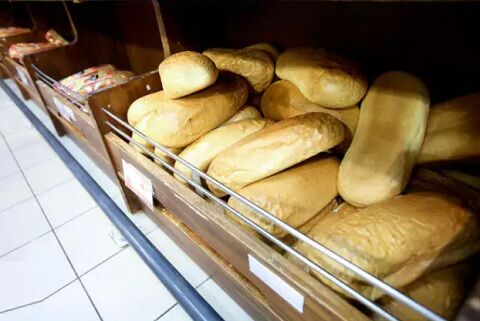
The regulation of bread prices, or staple food prices, still exists even in modern Israel.
In other words, Israel…
>>1In the case of Israel, it seems that while they can set any price they want for added-value bread, they are required to produce bread at least at this level and to standardize the price.
So not all bread prices are controlled, but there exist extremely cheap breads that can be classified as a staple food at a minimum standard price.
Japan not only managed the price of rice but also the price of soba.
Most countries are doing it.
A riot is going to happen.
I wonder if it will be like Japan during the Edo period when it was based on the rice standard.
Bread
Tea
Night duty
Shifting the topic to rice.
>>7They’re trying to intervene and bring it down right now.
Is this okay?
>>7Trump is
That’s foolish.
Sore! Sore!
Isn’t the concept of a free economy fundamentally quite new and chaotic in history?
The salt monopoly system in Japan ended in 1997.
Is it a cartel?
If the government doesn’t decide, the big merchants will probably collude.
If it’s profitable, anyone would do it.
Indeed, it is the market economy that defines a developed country.
Let’s liberalize rice.
It’s like France is another world.
>>15A woman who longed for France finds that when she goes to France, the gap between her imagination and reality is so great that it drives her to madness.
To be blunt, it’s dirty compared to Japan.
Then why is this child so surprised…?
>>16It’s actually more real because this child simply doesn’t know.
>>16I think it’s more fitting for middle and high school students not to know about it.
In modern Japan, the only prices set by the government are for public baths.
>>17On the contrary, why is the price of such a thing already determined?
>>19It was determined by the post-war price control order that raising prices excessively during a time when the availability of baths was poor would worsen sanitary conditions.
>>19The source of public health law is Article 25 of the Constitution of Japan.
All citizens have the right to maintain a minimum standard of living that is healthy and culturally adequate.(2) The state must strive for the improvement and enhancement of social welfare, social security, and public health in all aspects of life.To implement this, most of the water bills for public baths are paid by local governments.
As a result, there are few properties without baths, and currently, there is quite a lively discussion in local councils about the abolition of public baths.
>>17How about tobacco?
Is there something else besides ignorance?
Are you my mom for buying me snacks?
Thank you.
The government has been angry about the bread made with excessive subsidies in French Polynesia being used as animal feed.
Due to the post-war housing circumstances, not all residences were equipped with baths, which reflects the remnants of that era.
You can’t raise prices freely, but there are subsidies for fuel and water bills.
I feel like there was a strange device somewhere in Europe to punish malicious bakers who deceive the weight of their bread.
I don’t like it when more people who don’t take baths start to smell everywhere.
Of course, the prices of essentials like salt are bound to be stabilized.
>>27Country: “We don’t have enough money, so we’ll raise taxes and increase prices.”
>>38It’s time for a revolution…!
>>38It’s basically better to deal with taxes than when a merchant suddenly says they’re going to multiply something by five.
>>38The Yellow Turban Rebellion
I think it would be quite surprising to learn that the prices of staple foods are regulated if you grew up in modern Japan.
In reality, it seems that foreign rice is regulated more by tariffs than by price control.
This is something that gets posted here regularly, and they were seriously doing exclusive sales of salt until recently.
The government should also set the retail price of rice.
It would be bad to make this the market price in the city.
I heard that during the war, rations weren’t just distributed for free with tickets simply by saying, “Let’s give the right to buy!” and I felt dizzy from the inconvenience.
“Ch. But there was.”
>>36Is the story about the bakery where Albert from the final chapter was?
The government also sets medical expenses based on points, and it’s crazy if you convert essential living costs to market value.
>>37In America, insurance doesn’t cover much, and there’s a problem now where funds are acquiring pharmaceutical companies and raising drug prices by several times.
Shall we open a black market on the bulletin board? Nutritional stew for 100 yen.
The commonly referred to controlled bread, with price and quality standards set by the Israeli government.
The quality is low, and it seems that it often doesn’t sell out, but it sounds like spreading jam on this and eating it can serve as a snack substitute.
>>41If they are left unsold every time, it seems like a disposal route would be established.
In areas where tap water is not suitable for drinking, mineral water is cheap for the same reason.
Ugh, it’s control bread again today…
Sometimes I feel like having Hokkaido cheese steamed cake…
When the government sets prices, that’s when plaster bread comes into play.
There was a time when gypsum was cheaper than wheat, which led to the invention of white, beautiful, and inexpensive bread.
Those who made it were hanged.
>>48Huh… can you eat plaster? But I think they say something about using edible plaster to solidify tofu pudding…
Oh, so that’s how it is.
I thought the most famous one was the French baguette.
That’s why it’s called a super sento.
Because it’s a super public bath, it can escape from the country’s regulations.
>>50Even at a public bath, the sauna fee is an option.
If you add a sauna, there are some public baths that are cheaper than super public baths!
>>50On the contrary, why is such an excuse being accepted?
>>145At that time, health clubs were in fashion.
Even now in Japan, the price of wheat is essentially determined by the government.
When Japan goes to war, won’t there be nothing to eat but rice, beans, and sweet potatoes?
>>52That’s someone who’s obscuring the source of fertilizer imports, so you don’t need to trust them.
Once we enter wartime, we won’t be able to secure the necessary nutrients beyond that.
>>53In other words, isn’t it even worse?
You say “if a war breaks out,” but it also depends on who we would be fighting against.
>>56The supply of wheat from Ukraine was tremendous, so when Russia’s invasion war started, the prices skyrocketed and bakeries and cake shops in Japan were crying out, but within a year, it became stable.
It’s important whether you have connections to source it through a different route since it’s being made all over the world…
The reason Japan’s food self-sufficiency rate is low is that farmers tend to want to produce things that can earn them money; therefore, if necessary, if we were to clear all those fields and turn them into potato fields, we could immediately reach 100%.
It’s an extremely outrageous argument.
>>57It’s only natural that I wouldn’t create something if I can’t earn enough to live on!
Taxi fares are determined by the price range set by each prefecture.
No matter what anyone says, the number one thing that is directly linked to approval ratings is food.
If we can’t import fertilizer, we can just use fish meal.
Is that Italy? What is that? There’s no country called Italy. There’s a Virezz but no Italy..! I see, this must be like another world. The founding of the Italian Republic is several hundred years away, so it doesn’t exist yet. They said something about serving sweets at a public bath, but no, that doesn’t happen. Is there something you’re curious about? Just leave it to me!!
Completely another world
In the past, Japan had something called standard price rice.
Everyone is buying rice above that, so its historical role has come to an end.
From the perspective of an ordinary consumer like me, it feels like the result wasn’t all that significant.
Behind the scenes, there must be the efforts of trading companies and officials negotiating desperately to secure wheat from around the world.
Management of salt prices was seriously the foundation of the country’s tax revenue.
In China, rebellions are occasionally breaking out due to the rising prices of salt.
It’s like… humanity keeps repeating the same problems.
>>67How does the government collect taxes from the public?
The accumulation and repetition of how the masses resist it.
>>67People in various positions are constantly pulling each other down, wanting only to benefit themselves.
Sometimes similar things just come up.
The self-sufficiency rate of cabbage is 99%, so it’s reassuring.
I wonder if the impoverished were able to survive during the period when everything was being price-controlled, like in the Soviet Union before market liberalization.
>>72Hey, I am the Great Famine of Tenpō.
Hi, I am the Irish Potato Famine.
Hi, I am Horodomor.
>>72By combining the poor, it is possible to eat.
Furthermore, I will ignore the layers that spill over even from that quality and variety.
>>72They were distributing it properly.
Dead
I want you to make breast milk bread.
Not an other world, but maybe somewhere in past Italy…
>>76Is it just that the protagonist’s brain is translating by itself and matching it with fitting words?
There were various things like alcohol, tobacco, salt, telegraphs, and telephones.
>>77If you grant privileges like postal simple insurance and telephone subscription rights and then neglect them, the results will not be good, so once corruption occurs, it’s necessary to replace the top leaders and increase oversight.
>>101The telephone subscription rights were nullified with government approval, but can we still monitor this?
I was disappointed when I went to see it and found out it was a type of manga that doesn’t have nipple tickets.
Hello! This water is 45 degrees, but oh, you’re still okay with it, huh? Gulp… Hello! The water feels nice, doesn’t it? Oh, hello there, you’re lively! If the water isn’t biting your butt, it doesn’t feel like you’ve really gotten in, right?!
There have always been people who engage in reselling-like activities since long ago.
Rather than controlling prices, it seems that Japan adjusts prices through tariffs and such.
Rather than a famine due to poor crop yield from bad weather…
A 200% price increase due to government price control mistakes is something that would be ridiculed by other countries.
>>82I wasn’t even in control, you know?
The citizen class, in a position to sell the balance in that area, was able to do as they pleased.
(The government tried to coordinate but couldn’t catch up.)
The food situation in Victorian England is amazing.
Let’s break down the landlords in the rice riots; it’s a Japanese tradition, right?
>>86You’re just all talk, aren’t you?
You will lead the way and strike the storehouse with a hammer.
Japan’s rice market was fully liberalized in 2004.
The JA that was given the vested interest is not functioning, and since they have exposed their disgrace, it would be fine for them to be disbanded or for some of their authority to be revoked.
>>88Even if you create another organization and give them that authority, it would be the same if they mess up.
It has nothing to do with another world.
It’s about time you stopped looking down on the other world.
>>92It’s not another world, but…
In a wheat society, the unscrupulousness of the millers sometimes becomes a topic of conversation.
I wonder what kind of tax revenue would be created from a perspective that feels more like another world.
>>94They say they will tax according to the amount of mana.
>>94The content of labor required varies by species.
>>94The moment you think about committing tax evasion, the magic of enslavement activates and kills you instantly.
>>94Those with low magical power tend to suffer from heavy taxes.
>>94“Exile tax and serves you right tax, perhaps.”
>>114If you are expelled, you will be taxed when it is already too late, but you will receive a tax reduction.
>>94Instead of paying taxes, things like magic power.
The collected magic power will be used for public services.
>>115The part with Big Mom in One Piece had a vibe like this.
It seems there was a time when the church had a monopoly on it.
By the way, what are the details of the image?
What, you don’t have a rice bankbook?!
If everything is privatized, it’ll end up like overseas water services, so it’s difficult to find a balance.
You are behind on your chanting payment for this month! Chanting is a duty of the citizens!
>>107If the barrier maintained by the magic power of all the citizens breaks, monsters will invade in the blink of an eye…
The part that monopolizes essential things for life like food and healthcare.
I wonder what would happen if I raised the price as high as I could squeeze it.
>>108Suppression of uprisings
Food aside, medical care isn’t that essential.
In America, if you’re not wealthy and need to see a doctor, it can become a serious issue, but as a country, it should be fine.
Is it the person from the original work “Taisho Baseball Girls”?
In a world where magic is heavily involved in infrastructure, it seems that those without magical power have no human rights.
Infrastructure engineers are a popular profession.
There are many mysteries about how they are surviving in the first place, right?
I think it’s impossible for the business to sustain itself if they quickly try to improve the working conditions in another world.
>>120The same thing was said about the abolition of slavery in the real world.
>>125They don’t really want to save the slaves over there either.
It’s the kind of vibe that makes it more advantageous for business owners to incorporate workers into the system and liberalize things.
>>120While there is a lot of school education alongside working on pieces in the orphanage, my first thought is that if everything goes smoothly without any setbacks, it wouldn’t be much of a struggle…
There are too many monsters, and it seems too dangerous—this is a typical Dragon Quest template, so those who complain might be treated like they can’t read the room.
>>121Unless the characters in the story express complaints and provide a convincing explanation, it isn’t worth engaging with.
The price of public baths is also determined by an agreement that sets a minimum amount.
>>123Public bathhouses are favored by the tax system and treated as important things…
>>129If you don’t take a bath, illnesses will spread.
Even though many houses have baths nowadays,
>>131What are those guys who don’t come in even though it’s fully automatic at home!
>>133Trash
>>133Pathogen
Some industries that cannot survive even with improvements in the labor environment are dying out today.
Even without any prior knowledge, just from what is written in this thread, I can read that a general high school girl without knowledge of history misinterprets being transferred to medieval Italy as being in another world…
Even though it is clearly visible that it will eventually collapse in a chain reaction, I believe I can escape it.
Just like infrastructure, if left alone, it will either stop yielding profits and gradually lose its workforce or, conversely, see a surge in prices if someone tries to take advantage of the situation, which is why many countries provide subsidies to protect primary industries.
In Europe, most countries provide over 90% in subsidies, but Japan only provides 30%.
Originally, bread was a tax.
Before Catherine de’ Medici married from Florence
There’s a story that France was living like barbarians, so I wonder if it was the cutting-edge region of the time.
The improvement of working conditions and the elevation of workers’ rights have been achieved through several stages.
Each time, society will fall into chaos if management doesn’t work like that.
Many capitalists have come out saying things like that.
In the morning, bread.
I’ve heard that things disappeared after the collapse of the Soviet Union.
>>140I’m not quite sure if it’s the logistics that have died or the production system that has died.
I think there was some level of confusion in companies or society where management became unviable.
The side with power just brushed it aside, saying they didn’t care about that.
>>142The Civil War… is that what it is!?
Well, if I say something inappropriate about the current topics in America, I might get hit with a bundle of themed images, so let’s avoid that.
What’s the title?
>>143I want to shoot breast milk.
>>146Thank you.
So I become the hated role, seen as a lackey of the administration.
When clothing, food, and shelter become speculative targets, the country becomes chaotic.
>>149Is modernity in disarray?
>>150It’s all messed up, isn’t it!
>>149But because it’s something essential for everyone, raising the price will make a profit!
In the case of controlled bread in Israel, it’s said to be inexpensive because it’s made from low-quality leftovers or old wheat.
One of the reasons was that neoliberalism after the collapse of the Soviet Union was too much of a market absolutism.
Currently, in progress, we all have problems in clothing, food, and shelter, even though the directions are different.
Indeed, there is probably no time in history when the issues of clothing, food, and shelter were less of a concern than in modern Japan.
Even homeless people can find a place to live if they go to the city hall.
>>156It’s just starting to get chaotic…
If it were a manga from the 90s, it would probably say something like “We did this in real life too.”
As a result of leaving it entirely to market principles, incidents of food hoarding leading to starvation and riots have occurred multiple times.
Even the French, who start ridiculous riots, have strict rules when it comes to baguettes. 🥖
Well, knowing about the exclusive offerings of a bakery is quite a hobby, really…
I’m a bit interested in medieval Italy, but the clothing looks very modern…

![[Manga] The magic trick that everyone tried to master as kids but couldn’t is trending, lol.](https://otaku-reviews.net/wp-content/uploads/2025/06/bf53dd2f.jpg)
![[Manga Time Kirara] Tell me your favorite couple in Kirara.](https://otaku-reviews.net/wp-content/uploads/2025/06/7f363a8b.jpg)
![[Gundam GQuuuuuuX] Even though you’re a Newtype, you’re so insensitive, Egusabe-kun.](https://otaku-reviews.net/wp-content/uploads/2025/06/b96ae33d.jpg)
![[Rune Factory] I’m sorry, but I live behind the general shrine.](https://otaku-reviews.net/wp-content/uploads/2025/06/af0f4933.jpg)
![[Fullmetal Alchemist] I have no certainty, but I feel like Envy is the weakest among the homunculi.](https://otaku-reviews.net/wp-content/uploads/2025/06/da613d5c.png)
![[Thunder thunder thunder] I thought this cover was sexy… so I bought it, and it turned out to be more interesting than I expected.](https://otaku-reviews.net/wp-content/uploads/2025/06/d303d5fc.jpg)